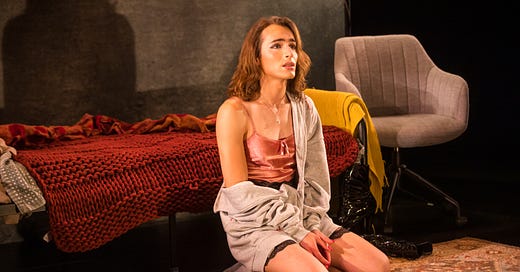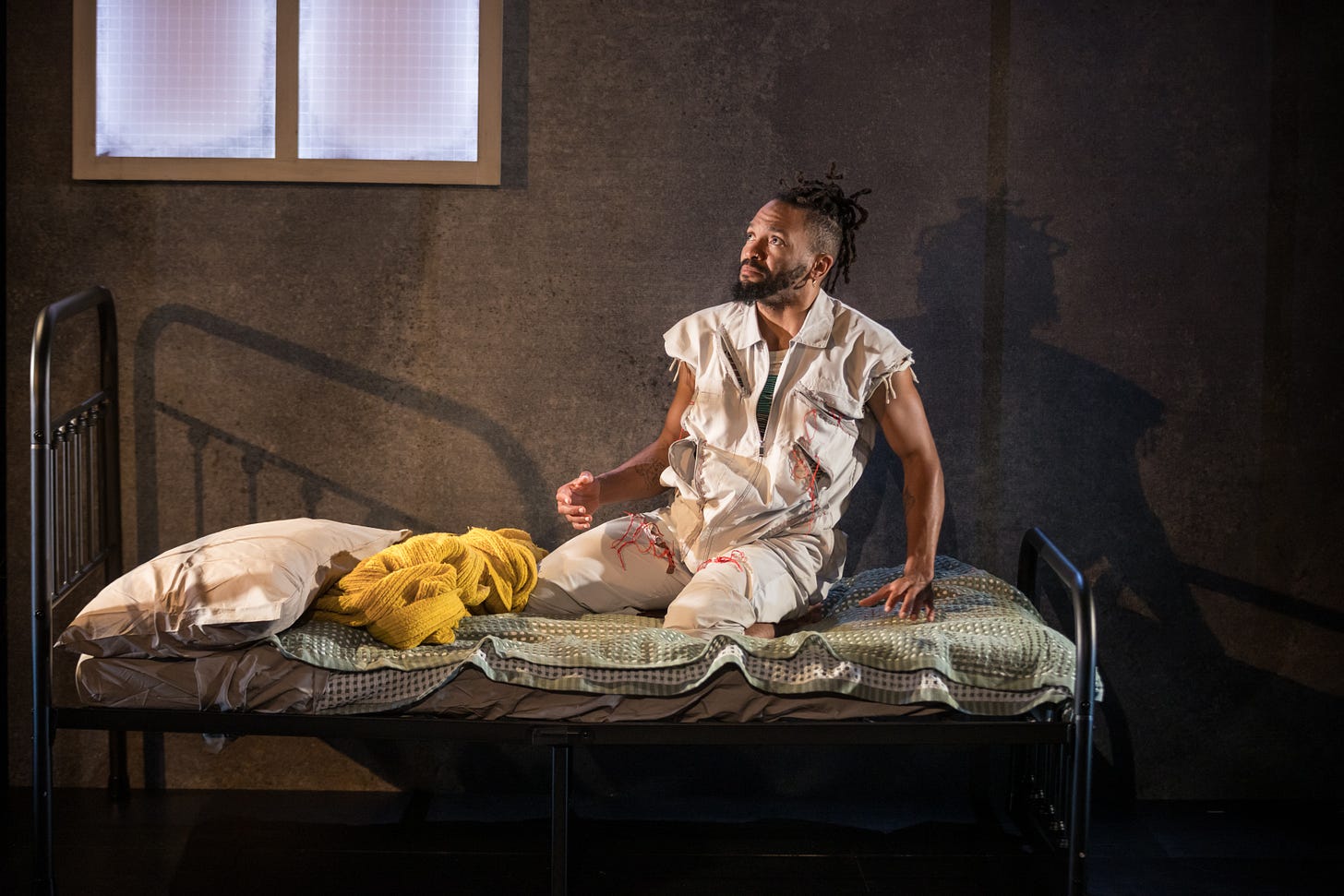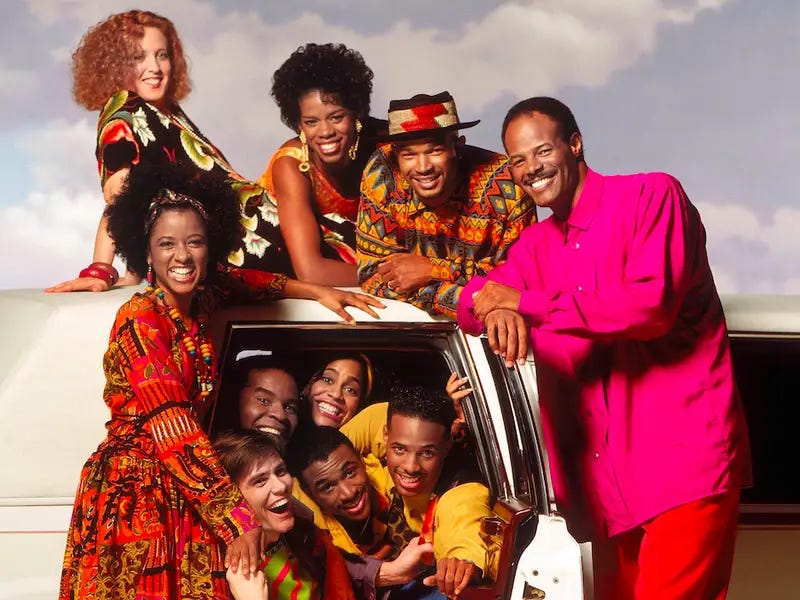April 2025 Media Log
My call for you to go to the theatre, giving the Wayans family their due, and wondering if my entire life is orchestrated by Nathan Fielder
Hot off the presses, I present the April 2025 Media Log, finished in a frenzy 30 minutes before I have to go work. That’s it, that’s my intro this week. Enjoy!
The Last of the Love Letters: A Plea for the Power of Art
I have the enormous privilege of serving on the board for Crowded Fire Theater, an organization that has long been my favorite theatre company in the San Francisco Bay Area. I’ve written about Crowded Fire Theater’s work a couple times before, and due to the ephemeral nature of regional theatre, I’m often racing to get the media log out in time for my readers to have a chance to see the production. Crowded Fire Theater’s current production, the West Coast premiere of The Last of the Love Letters by Ngozi Anyanwu, must close on May 3rd, and if I do my job right and get this published by April 30th, you will have four chances to see this personal, poetic, and poignant piece of theatre magic.
Anyanwu’s play began its life as one monologue written for Grogu’s daddy himself, Pedro Pascal, as part of a pandemic version of the 24 Hour Plays. When she later shared it with New York’s Atlantic Theater Company, she was encouraged to write a companion piece. The two monologues eventually became The Last of the Love Letters, an anguished cry that clearly spoke of the isolation everyone, but especially theatre-makers, felt during 2020; it was the first play Atlantic Theater Company produced post NYC-lockdown.
Director Nailah Unole dida-Nese’ah Harper-Malveaux was one of those first audience members. As she writes in her director’s note:
The Last of the Love Letters put a spell on me as one of the first plays I saw after lockdown lifted, following that very particular collective forced isolation. And now, four years later, it feels just as urgent…As capitalism, colonialism and fascism aim to isolate us from one another and from our own bodies, this play seeks connection in the darkness, in breathing with strangers.
Anyanwu, in a conversation with Bay Area Reporter, noted that it was “interesting for me to see another group of artists pick up this play and find resonance in it now”, adding that “[w]e may not be in the midst of a pandemic, but the arts are still under siege. It feels like we’re approaching a fascist regime, if we’re not already in it. The theater industry is feeling leaner and more held back.”
If the original staging of The Last of the Love Letters was inspired by the idea that we might never make art again in a world where you might die if you go outside, Crowded Fire Theater’s staging is infused with the subtext of our current political moment. Helmed by a queer, multiracial director and performed by a trans and gender-expansive cast, one of whom is Palestinian and two of whom are Black, the play’s confessional humor, atmosphere of incarceration, and choreographed moments of dance and shadow play signifying lust and longing, freedom and despair, all mean something specific in this moment.
When I first read the script, I had a hard time envisioning it on stage. I nodded at the universal truths in each monologue’s dissection of a break-up, but nothing truly devastated me, or shook me in my seat, until the play’s final moments, which I will not spoil here. All the more credit to Harper-Malveaux and the creative team’s storytelling abilities that I was hooked from moment one, when Farrah Hamzeh exorcises bad relationship demons with a fun and seductive bedroom dance. As Hamzeh’s character, You, describes flattening herself to fit her partner’s fantasy, of hollowing herself out for approval, I recognized that behavior in my own experiences in relationships, and I also recognized in You’s words the hoops a trans woman has to jump through to be "acceptable” to anybody, not just a romantic partner.
When Gabriele Christian, as You No. 2, spins themselves in torturous circles trying to figure out why their partner left them, and laments, “I thought you could see who I was”, I recognized my own experience with being told that the way I showed up to my relationship every day for the past 365+ days was why I was now being dumped. As Christian vacillates between whimpering and screaming, and is immediately self-conscious about how they are coming off, I recognized the unique fear that a Black, masculine-presenting, person has of being seen as angry or crazy.
Further still, I recognized the other layer that Anyanwu always intended with this play: a relationship not between two people, but between an artist and their art. “Sometimes the relationship is toxic,” she says. “Sometimes you just want to stop doing it, but it has a hold on you, and you can’t. Sometimes you feel like it’s left you.” This subtext is brought to the forefront when You No. 2 reminisces about a time when they used to see plays, and the way they seem to almost be dictating memories like they are writing a poem.
If the play was just about people who look like Hamzeh and Christian discussing lost love and loneliness, then that would still be a story worth telling! But as the play goes on, and the space gets smaller, and memories seem to be fading, there is a story about art and censorship and disappearing people into dark rooms that is a warning here in 2025.
Link Roundup:
“From a Pedro Pascal prompt, ‘The Last of the Love Letters’”, Emily Wilson writing for 48 Hills
“Ngozi Anyanwu’s ‘The Last of the Love Letters’ at Z Space”, Jim Gladstone writing for Bay Area Reporter
The Wayans Family: Don’t Call it a Comeback
In the span of a week, I saw the Wayans family around every corner. First, I caught up on last month’s episodes of one of my favorite podcasts, We Hate Movies. They were covering A Low Down Dirty Shame, Keenen Ivory Wayans’ 1994 action comedy film that I had never heard of. Then, the trailer for HIM, an upcoming horror film from Jordan Peele’s production company, dropped, and I was hyped to see that Marlon Wayans is the co-lead. Finally, I realized that In Living Color, the incredible 1990s sketch comedy show created by Keenen Ivory Wayans, had celebrated its 35th anniversary that same week.
After this confluence of events had me looking up old In Living Color sketches, I realized that the Wayans family was in the ether in other ways. Earlier this year, the family received the NAACP Image Award Hall of Fame Award for their incredibly prolific body of work, which includes, among other things: the movies I’m Gonna Git You Sucka, Scary Movie 1&2, and White Chicks, and the tv shows In Living Color, The Wayans Bros., and My Wife and Kids. Next year, the Wayans’ are taking the Scary Movie franchise back over with Scary Movie 6. And up until the news hit on April 22 that CBS cancelled it, I was enjoying the sitcom Poppa’s House, starring Damon Wayans Sr. and Jr.
Despite being born in 1991, and therefore more likely to be exposed to the Wayans family via White Chicks and My Wife and Kids, my Wayans family education began with In Living Color, which my very hip white mother was a fan of during its original run. When the DVDs started being released in 2004, my mother was quick to snap them up and teach me all about two snaps up. She absolutely adored Damon Wayans and we relished his performances as Homey D. Clown and Anton. I was stoked to see the early careers of two performers who I knew as parents on Disney Channel shows, Tommy Davidson (The Proud Family) and T'Keyah Crystal Keymáh (That’s So Raven), not to mention early James (Jim) Carrey.
My mom was firmly in the camp that In Living Color was funnier than Saturday Night Live ever had been, and there seemed to be two main reasons for this. One, the funny to unfunny sketch ratio was better, due to the show only being 30 minutes as opposed to SNL’s 90 minutes. Second, she enjoyed the fact that the show pulled no punches on anybody, as in they were equal opportunity mean. I think an unspoken corollary to that statement is that In Living Color, being a majority Black cast, could not only address huge swaths of Black culture that SNL couldn’t dream to touch - what with its lack of Black cast members - but it could be incisively biting about it too. SNL couldn’t goof on Arsenio Hall or Mike Tyson or Louis Farrakhan with any perceived authenticity or authority.
I’ve been reflecting on why I found In Living Color so funny, even though a lot of the topical stuff went over my head and I certainly didn’t have the lived experience of the Wayans. Should I have been conscious of a Chapelle’s Show effect, where a white audience was too comfortable laughing at exaggerated Black stereotypes? And what of the elements that have aged more poorly, both in In Living Color and in the Wayans’ other work? There are jokes that are blatantly ableist or homophobic and send a fully-body cringe down my spine. At the same time, the gay characters in their work have some interesting and complicated wrinkles. The Men On characters from In Living Color, two stereotypical effeminate gay men played by Damon Wayans and David Alan Grier, were criticized by some LGBTQ viewers and embraced by others. Grier, whose portrayal was inspired by gay friends of his in the Broadway community, has said:
There was nothing in that comedy which I felt was homophobic gay hatred. But I also am smart enough to know it’s not how your heart was behind the joke; it’s how that joke or that characterization lands with other people…If Living Color were on now, I would hope that there would be more than one gay cast members in the show, and then they could tackle this humor using their voice. (link here)
In the We Hate Movies episode on A Low Down Dirty Shame, they discuss the homophobic jokes made at the expense of the character Wayman, played by Corwin Hawkins. Wayman, like the two Men On characters, is a stereotypical character, but unlike the Men On characters, was played by a gay man. Hawkins had appeared on Def Comedy Jam in drag, which inspired Keenen Ivory Wayans to cast him in the movie. As Grier pointed out, it’s not about intention as much as it’s about impact when it comes to this kind of humor, but I do think it’s notable that Wayans wanted to highlight a gay comedian in his Hollywood blockbuster.
The Wayans family, and their comedic oeuvre, isn’t for everyone. But I do think the comedy world would be so much worse without them.
Link Roundup:
Keenen Ivory Wayans’ interview with the Television Academy Foundation
“‘Homey Don’t Play That’: A Tale of Emmy-Winning Black Sitcom ‘In Living Color’”, Christopher John Stephens writing for Pop Matters
“Gay Black Lives Matter: The Importance of TV’s Sudden About-Face in LGBT Racial Diversity”, Les Fabian Brathwaite writing for Out.com
“‘We Were Warped Out of Our Minds’: ‘In Living Color’ Stars Recall Fox Censors, Spike Lee’s Disdain in Dishy Oral History”, Mara Reinstein writing for The Hollywood Reporter
The Rehearsal: Nathan Fielder’s Diabolical Genius
I frankly don’t have the current brain power to give Nathan Fielder’s HBO show, The Rehearsal, the full mid-term paper that it deserves. In all honesty, I will probably return to The Rehearsal at a later date, since we are only two episodes in to the current season. But I like to have three main sections in my media logs, so a rushed and manic assessment of this social experiment/aviation safety improvement course/method acting pyramid scheme will have to do for now.
Nathan Fielder is a Canadian comedian, whose entire shtick can be described as a blend between cringe comedy and parodying reality television1. His show for Comedy Central, Nathan For You, ran from 2013-2017 and was a mockumentary where each episode he would ostensibly give advice to help small businesses, since he graduated from one of Canada's top business schools with really good grades. His next TV show, The Rehearsal, premiered on HBO in 2022, and is ostensibly about Nathan helping people rehearse for challenging or difficult conversations or experiences, utilizing HBO’s seemingly bottomless resources to do things like build exact replicas of people’s apartments and bars they go to on a soundstage in Los Angeles, and hire a crew of actors to play the real people in each scenario.
Is The Rehearsal a mockumentary? While it shares some elements with Nathan For You — Nathan’s awkward persona, people admitting to absolutely wild things on camera, narration that comedically cuts against the grain of what you’re actually seeing — The Rehearsal feels closer to actual documentary, Fielder’s sincere effort to understand human behavior. In the first season while the focus is theoretically on helping Kor and Angela, it ends up being as much or more about Nathan trying to understand himself. Why does he need to be in control and rehearse everything? Is he repeating the mistakes of past relationships when he lets Angela walk all over him in a scenario where they are a raising a kid together?
Is any of this biographically true about Nathan Fielder? We have no idea! The seeming sincerity in The Rehearsal is just as carefully constructed as any reality television program, which seems to be the point.
The newest season teases even more autobiography and sincerity, and I’m prepared to fall for it again. Instead of seeking people out for the show who want help rehearsing something, Nathan wants to tackle his own passion project - preventing aviation disasters caused by pilot and crew error. Per usual, he spends an obscene amount of money building a replica of an airport and of a cockpit, he recruits pilots and first officers, as well as actors to play them.
In the second episode, while the aviation framing device is very much still there, the most compelling parts have to do with Nathan himself, and specifically his career in the entertainment industry. In a bid to test a first officer’s ability to speak up to their pilot and say something they don’t want to hear in a non-confrontational way, Nathan organizes an audition for a fake singing competition based on his days as a producer on Canadian Idol.2 The first officers are responsible for telling the singing hopefuls that they will not be moving on to the next round, and then the singers are asked to rate the likability of the first officers. Nathan, who found this part of the job challenging when he did it, becomes obsessed with emulating Mara’D, the first officer with the best ratings, and is dismayed when he keeps getting scored lower than her.
In his narration, Nathan drops something that seems to be a thesis for his work:
I’ve always felt that sincerity is overrated…It just ends up punishing those who can’t perform it as well as others.
Then, in a subplot that seems pretty darn sincere, Nathan reveals that an episode of Nathan For You, "Horseback Riding / Man Zone", was removed from the Paramount+ streaming service in late 2023 for the stated reason of sensitivity around “anything that touches on antisemitism in the aftermath of the Israel/Hamas attacks.”3 Learning that the decision originated with Paramount’s German office, Nathan decides to rehearse a conversation at the German headquarters. And, well—
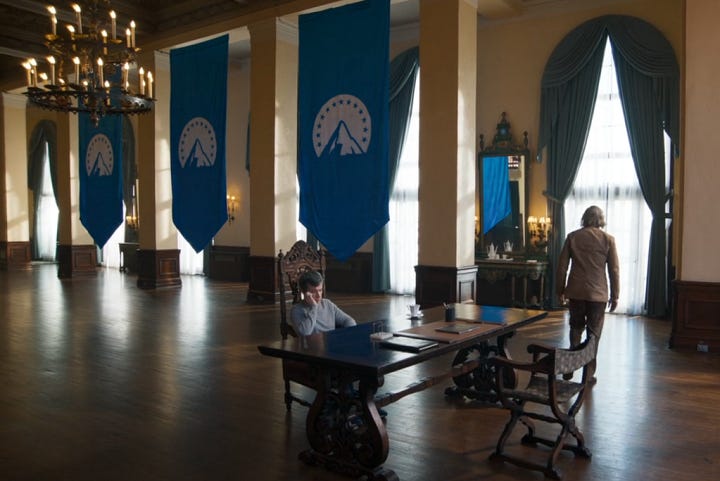
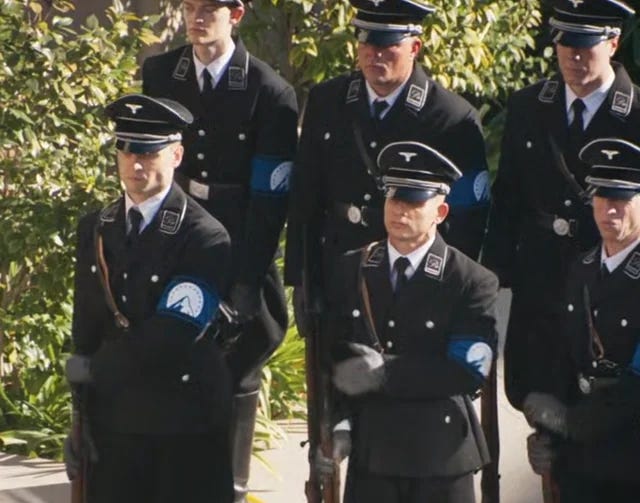
Unlike a lot of Fielder’s carefully created artifice, his frustration with the work of a Jewish comedian discussing antisemitism being censored comes through, even as I can’t stop laughing at Paramount Reich cosplay. I have no idea where this season is going, but I cannot wait to get there.
Link Roundup:
“What IS Nathan Fielder?”, video essay by Super Eyepatch Wolf
“The Rehearsal’s Latest Episode Makes a Very Dark Joke. But It Doesn’t End There”, Sam Adams writing for Slate
But maybe, sometimes, just actually creating reality television? This will be A Theme.
And yes, Nathan Fielder worked on Canadian Idol during the season that Carly Rae Jepsen was on it, and yes, I will be obsessed with this fact for the rest of my life.
The episode is partially about Nathan founding a company, Summit Ice, whose brand is equally focused on Holocaust education and sports outerwear.

